
by Dharam CW2 | Apr 14, 2024 | Professional Development Webinars
Join me for an insightful webinar with Glaucio Pessoa, MBA, MSc, PE, PgMP, PMP, PMI-ACP, a seasoned Project and Program Management Professional from Alpharetta, Georgia, United States. This webinar is designed for senior project, program, and portfolio management professionals eager to explore business intelligence leadership.
This webinar will cover, among many, the below topics:
– The Role of Leadership in Cultivating a Data-Driven Organization: Perspectives on Success Factors
– The Necessity of Business Intelligence and Data Analytics for Effective Leadership
– Evolving Leadership Styles for a Competitive Edge in the Data-Driven Technological Landscape
– Identifying the Pitfalls: Why Some Data Analytics Initiatives Fail to Deliver Actionable Insights
– Strategies for Large Companies to Enhance Their Data and Analytics Capabilities
Attendees will benefit from Glaucio Pessoa’s experience and insights, and gain 1 PDU as an added benefit.
🔗 Reserve your spot now: https://bit.ly/3TSx8fj
Session Date & Time:
Friday, 03 May 2024
05:00 PM – 06:00 PM (PDT) / 06:00 PM – 07:00 PM (MDT) / 07:00 PM – 08:00 PM (CDT) / 08:00 PM – 09:00 PM (EDT) / 09:00 PM – 10:00 PM (BRT)
Saturday, 04 May 2024
08:00 AM – 09:00 AM (SGT/MYT) / 09:00 AM – 10:00 AM (KST/JST) / 09:30 AM – 10:30 AM (ACST) / 10:00 AM – 11:00 AM (AEST) / 12:00 PM – 01:00 PM (NZST)
🚀 Elevate Your Project Management Career:
– Book an obligation-free consultation session on Project management Career, training, and certifications: http://talktodharam.com
– Discover training offers and certification discounts: https://bit.ly/3jWVepD
– Stay updated with our Q&A series and certification success stories by subscribing to the vCare Project Management YouTube channel at https://bit.ly/2YF0wJl
– Follow Dharam podcasts and interviews with Project Management Experts on YouTube at https://bit.ly/2NDY8wd
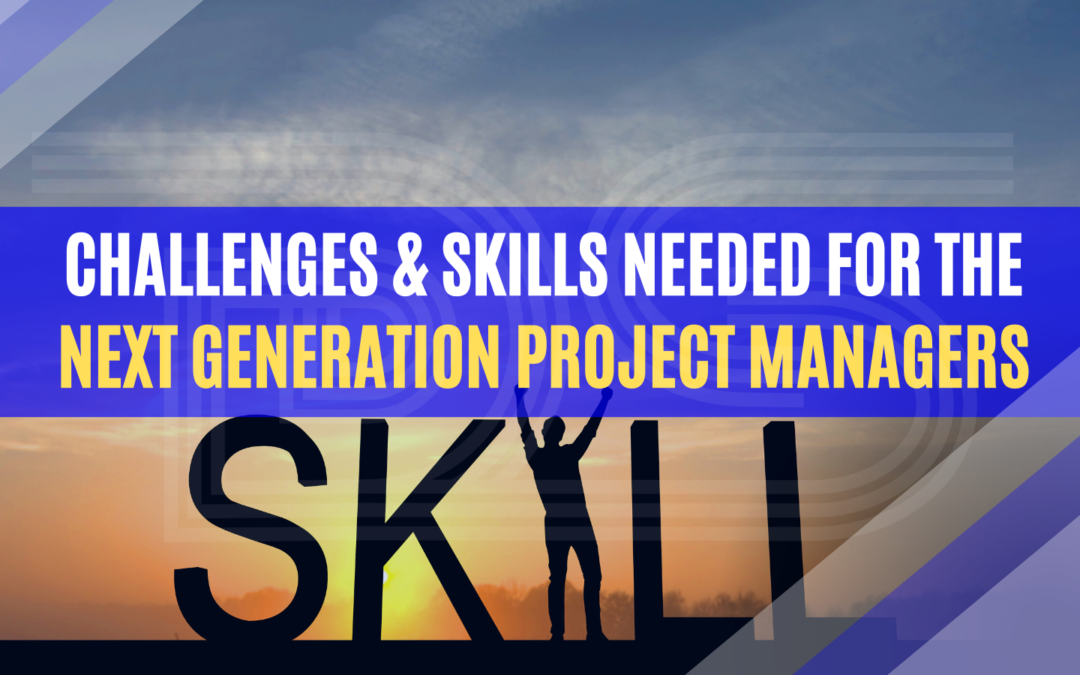
by Dharam CW2 | Aug 25, 2023 | General
The modern workplace is undergoing a significant transformation. As a result, project professionals in both the public and private sectors worldwide have started to recognize the full range of benefits that successful project management can bring to their businesses and are prepared to make the required adjustments, particularly on cultural changes.
The success of each project is dependent on an effective project management strategy. Considering the next generation of project professionals, it is critical to have an efficient leader who can direct this process since it is methodically planning, organizing, and executing a pre-determined series of procedures to maximize resource utilization and achieve objectives. Project goals will likely be met with a manager monitoring adequate planning and checking off milestones.
To compete in the upcoming competitive market, a project manager must have the technical, digital, and other essential project management skills to comprehend future project challenges. On the other hand, a project leader with an effective skill set can tackle all the challenges in a project in the right way. So here are some of the challenges and skill sets to manage a project for the next generation of project managers.
Challenges of Project Management
According to data provided in the PMI’s Pulse of the Profession 2020, 11.4 percent of corporate investment is lost owing to poor project performance.
What variables might contribute to poor project performance? There are examples of a need for more precise planning, inconsistent procedures and techniques, incorrectly managing or accounting for all project stakeholders, budget overruns, and other causes.

Categories of Project Failure
However, if we take a step further, the causes of project failure fall into three major categories:
- People
- Processes
- Communication
Let’s look at the most common challenges for project managers and some tips on how to overcome them.

Challenges of Project Management
- Undefined Goals
Identifying project goals is one of the most common challenges in project management. The entire project and team might suffer when objectives need to be clearly defined. When top management cannot agree on or support undefined goals, the project has a limited likelihood of success. To define and convey clear goals, the project manager must ask the right questions and make the right decisions.
- Scope Creep
“Scope creep” occurs when incorrect project management permits the scope of a project to expand beyond its initial objectives. Clients and supervisors may request modifications to a project, requiring the project manager to examine each request and determine how and whether to accept it meanwhile also conveying the implications to all stakeholders regarding budget and timelines.
- Inadequate Skills for the Project
A project may necessitate the use of talents that the project’s contributors may need to have. Project management may assist a project manager in determining the required competencies, assessing existing personnel, and recommending training, outsourcing, or recruiting extra people.
- Lack of Accountability
When each team member accepts responsibility for their role in project success, the project manager’s leadership characteristics may come through. A lack of responsibility, on the other hand, might bring a project to an end. Learning to lead groups toward a shared objective is an essential part of project management.
- Improper Risk Management
Another key aspect of project management is learning to cope with and plan for risk. Because projects rarely go as planned, risk management is a desired project manager trait. To do their work effectively, project managers must solicit input, build trust, and understand which aspects of a project are most likely to deviate from the original plan.
- Ambiguous Contingency Plans
Project managers must understand which path to pursue in pre-defined “what-if” situations. The entire project may become entangled in unexpected problems if contingencies are not recognized. On the other hand, requesting that people identify possible problem areas can result in a smooth and successful project.
- Poor Communication
Poor communication can cause major project management issues. Project managers must offer direction at all project stages so that each team member understands what is expected from them. Therefore, effective communication with all people involved in the project is critical to its success.
- Resource Deprivation
Management must offer adequate resources for a project to function smoothly and successfully. The project management process aids project managers in establishing demands and securing approval up front, as well as how to assign and prioritize resources during a project.
- Lack of Stakeholder Engagement
A project can be ruined by an uninterested team member, customer, CEO, or vendor. A skilled project manager communicates openly and invites input at every stage to increase participant participation.
- Digital Transformation
Adapting to the correct tools, systems, and procedures becomes even more crucial as more firms board the digital transformation train. This difficulty stems from adapting to the appropriate project management system, enabling teams to construct, change, and improve existing procedures to expand and scale.
Overall, project management is in great demand and isn’t going away anytime soon. Indeed, project management is anticipated to expand by 33% by 2027. However, to keep up with the ever-changing business landscape, project managers must be updated on proper project management methods and trends.
Major Challenges for the Next Generation Project Managers

Major Challenges for the Next Generation Project Managers
- The first major challenge project managers must confront is technology globalization and the disruption of traditional corporate culture and model. This aspect includes eliminating the requirement to do business or manage projects from a single place. The adaptation of the “virtual team” has become a must, and a company’s agility might mean the difference between success and failure. What used to take months may now be accomplished instantly, emphasizing the necessity of a company’s ability to fast and naturally adapt to the fluctuating nature of today’s technology culture.
- The second major concern is worker involvement, a project manager’s capacity to grasp various roles and responsibilities and use agility to wear numerous “hats” depending on the project. Knowing generational drives, establishing moral leadership, and understanding how the team performs are all part of this.
- Finally, project managers will be impacted by innovation and risk. The problem is figuring out how to strike a balance between innovation and risk—as managing risk is an important project management skill—but without it, it’s hard to realize the entire project’s potential.
Future Trends of Project Management
Consider project management ten years ago: fewer tools, smaller teams, and more straightforward tasks. Since then, the project landscape has changed dramatically, with important developments such as:
- Blockchain
- Artificial intelligence
- Sustainability
- Remote teams

Future Trends of Project Management
Trend 1 – Blockchain
More businesses use blockchain technologies for management, such as when conducting dispute investigations. The capacity of blockchain to automatically update data makes it ideal for reconciling records and transactions. One of the most significant contributions of blockchain to project management will be smart contracts, which are effectively self-executing contracts powered by computer code.
Smart contracts reduce the number of key functions within the project manager’s scope, such as checking on project milestones and assigning new ones, which speeds up management processes. As a result, quicker workflow assures project completion on time and improves a company’s overall performance.
Trend 2 – Artificial Intelligence
Artificial intelligence is increasingly finding its way into project management systems, managing anything from predictive analysis to risk management. Because of its efficacy, as per the PwC report, by 2030, AI is expected to contribute:
- $42.7 B (7.7%) to Egypt’s economy
- $135.2 B (12.4%) to Saudi Arabia’s economy
- $96.3 B (13.6%) to the UAE economy
The primary capacity of AI is to provide data insights for decision-making, which increases the agility of any given project.
Trend 3 – Sustainability
Project sustainability is more critical than ever now. Governments and societies worldwide are demanding greener alternatives throughout the life cycle of a project.
Green initiatives are cost-cutting solutions for businesses. For example, energy is required for project completion, and shifting to renewable sources reduces costs. In addition, this frees up resources that may be directed toward other essential areas like innovation and research. Meanwhile, sustainable practices improve a company’s reputation and encourage consumer loyalty.
Trend 4 – Remote Teams
Remote teams have been the norm since the advent of communication technology. As a result, businesses gain from a more diverse and borderless talent pool easily available through contracts. In addition, they spend less on office space, travel, and other administrative expenses.
Data from Upwork’s Future Workforce Report 2021 revealed that more than half of the US population was working remotely to some level. Furthermore, 40.7 million Americans will likely be fully remote during the next five years.
Furthermore, in its 2022 State of Remote Work Report, Buffer discovered that 97% would promote remote work to others and continue to work remotely, at least for some time or for the rest of their lives. On the other hand, just 26% of businesses are prepared to offer a remote work environment.
As a result, it’s not unexpected that more workers anticipate that workplaces will become entirely virtual over the next several years. In general, remote working arrangements enable businesses to extend their resources while increasing operational efficiency. As such, they are crucial in developing lean, competitive firms.
Key Skills needed for Next-Generation Project Managers
Because of rising trends such as remote teams, digitalization, and automation, project management has changed dramatically in recent years. More companies rely significantly on technology to plan, execute, and monitor work.
As an example:
- Big data and artificial intelligence for better risk forecasting
- Remote progress tracking using digitization technologies
- Automation software for more efficient execution
These solutions have improved firms’ management capabilities and altered project management’s future.
According to Gartner research, 80% of management duties will be automated by 2030, and future managers will need more technical skills. They must be knowledgeable about cybersecurity, blockchains, machine learning, and robots, all of which are expected to play larger roles in management.
To stay up with trends in modern project management, a fundamental understanding of topics such as data science, conflict resolution, and entrepreneurship is required. For example, data science skills may assist a manager in incorporating AI into more elements of the project life cycle. Here’s a closer look at what these skills include and how they’ll stay up with future innovations in project management.

Key Skills Needed For Next Generation Project Managers
Skill 1 – Data Science
Big data insights are essential management tools in the future, especially for large projects with extensive life cycles. In terms of planning, insights from previous projects indicate inefficiencies that can guide the current project, such as the number of idle hours and their causes. In terms of execution, data analytics assess progress and spot deviations early, such as changes in material prices and exchange rates that exceed estimates.
Skill 2 – Conflict Resolution
Today’s projects are extremely complicated, with constantly changing deliverables. As a result, conflicts are never far away.
These conflicts, if left unaddressed, can undermine your team’s performance, resulting in delays and missed deliverables. Managers must thus understand the aspects of conflict resolution, such as:
- Behavioral and organizational aspects of a positive workplace
- Effective communication
- Effective contingency planning
Skill 3 – Entrepreneurship
Project managers are essentially CEOs. On the one hand, they are in charge of project deliverables, while on the other, they are negotiating with shareholders and setting targets based on estimates. As a result, being productive requires more than technical and administrative skills. Project managers must also have entrepreneurship skills, such as strategic thinking and market insight. This skill is beneficial for modifying deliverables, which is typical in agile projects like software development.
Skill 4 – Resource Management
Budgets and timeframes became tighter as projects got more significant and more complicated. Today’s project managers must balance budget constraints, deliver quality, and achieve deadlines with limited resources. They are entrusted with creating a lean organization.
For optimal efficacy, a delicate balance of resource allocation is required, as over-allocation to one activity inhibits the others. So, managers must understand resource management principles such as equilibrium shifts and flexibility.
Skill 5 – Digital Skill
Digital skills are essential for future project managers. According to the CBI’s report on developing a world-leading innovation economy, upskilling employees with digital skills is critical. However, the digital skills pipeline could be improved. They believe more should be done to foster more ambition in that field.

Digital Skills For Project Managers
Project managers need to have the following digital skills:
- Data analysis, analytics, and management
- Data security and protection
- Compliance with the rules and regulations
- Leadership and collaboration online
- Management of knowledge
- Decision-making based on data.
Considering the vital significance of the project manager’s role and how it changes, here is a list of additional skills for project leaders to follow in the present and future to enhance their careers and succeed.

Skills For Future Project Leaders
- Emotional Intelligence: The capacity to detect and interpret events and interactions (both verbal and nonverbal) in the context of the project plan.
- Adaptive Communication:The ability to explain one’s views to various individuals, groups, and cultures, whether orally or in writing, utilizing the most successful communication approaches for each group.
- People Skills: The ability to rapidly establish and maintain strong connections with team members and stakeholders.
- Management skills: The capacity to serve, encourage and concentrate a team, and create team member collaboration.
- Flexibility:The willingness and capacity to modify one’s project management style and course of action in response to business needs.
- Business Skills:Understanding the organization’s business, strategy, and industry. Understanding of a plan and ability to coordinate tactical work around that strategy.
- Analytical abilities:The capacity to think through circumstances and make judgments.
- Customer Focus:The ability to comprehend the end user’s or end customer’s demands and the drive to guarantee that projects meet those needs.
- Results-Orientation:The capacity to do tasks efficiently and successfully.
- Character:The project manager should have a pleasant demeanor and a solid moral and ethical foundation.
Final Thoughts
With a focus on the future generation, we’ve entered a project management world where we need to be aware of the key challenges we’ll encounter as project managers and the skills we’ll need to improve to succeed: technology globalization, worker engagement, and the battle between innovation and risk. There are, however, a few crucial insights to remember as you continue your journey through the strange and ever-changing world of project management.
- Be agile or be gone:Business constantly needs greater flexibility, strategy, and adaptability than ever before. No one strategy will work every time; knowing how to adjust to change with agility and rapidity is essential.
- Expect all teams to act differently:Teams will always be more diverse than those who make them up. However, you can lead more successfully if you genuinely grasp your team and each member’s unique imperatives. Because project teams determine project success, one of the most crucial skills of a competent project manager is the ability to construct an effective, high-performing team.
- Help team members understand the big picture:This will assist them in preparing for obstacles. When attempting to resolve an issue or manage change, keep the immediate consequences in mind to prevent losing sight of the forest for the trees.
Feel free to check out my discussion on this topic with Thomas Walenta in YouTube
For any questions related to your Project Management career, training, and certifications, you can book an obligation free 15 minutes session with me by visiting https://bit.ly/2SbhTOK
You can subscribe to the vCare Project Management YouTube Channel to catch future videos of our Q&A series and certification success stories: https://bit.ly/2YF0wJl
You can subscribe to and follow my podcasts and interviews with Project Management Experts on YouTube at https://bit.ly/2NDY8wd
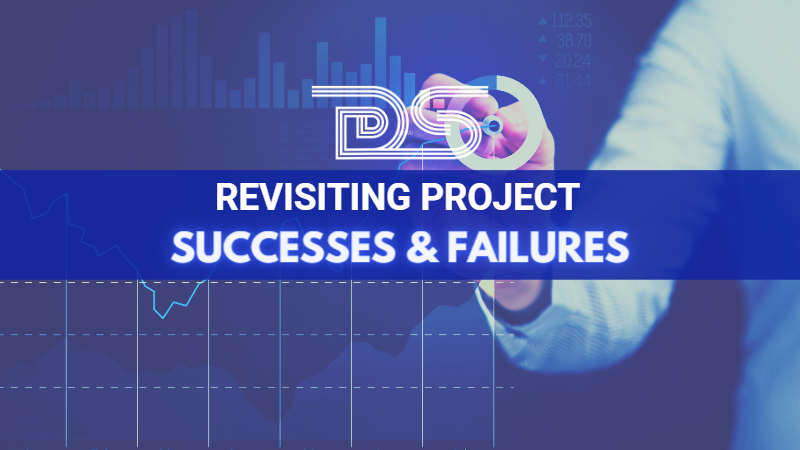
by DharamCW | Jan 15, 2023 | General
A project can be a complex, nonroutine, one-time effort constrained by time, budget, schedule, satisfaction, quality, and scope to meet the customer’s needs. Today, many businesses prioritize project management because it focuses on meeting project objectives and achieving them successfully. Moreover, it got significant because it employs managerial processes and tools that give managers a good chance of achieving their project’s goal.
Project Management Today
Project management has become an essential part of various industrial segments because it crosses corporate and geographic boundaries, adapting to the unique characteristics of various businesses and teams. Here are some of the project trends on the project’s success/ failures.
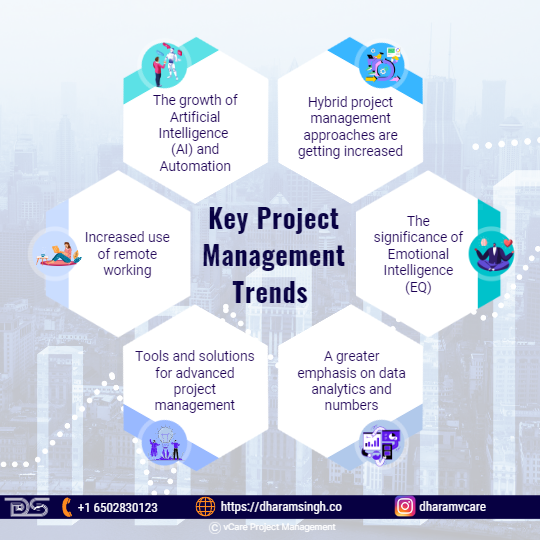
Key Project Management Trends
The Most Important Project Management Trends for 2022
- The growth of Artificial Intelligence (AI) and Automation
- Hybrid project management approaches are getting increased.
- The significance of emotional intelligence (EQ)
- A greater emphasis on data analytics and numbers
- Tools and solutions for advanced project management
- Increased use of remote working
Key Project Management Statistics 2022 (Success and Failures)
Project Success Statistics
- Project management software is used by 77% of high-performing projects. (Hive, 2020)
- 35% of organizations are somewhat satisfied with their project management maturity level. (Wellingtone, 2020)
- 29% of projects are completed on time (Wellingtone, 2020).
- Surprisingly, 54% of organizations lack access to real-time KPIs (Wellingtone, 2020).
- Around 51% of organizations complete projects that meet the business objective or original goal. Meanwhile, 52% of organizations complete projects that meet the needs of stakeholders (KPMG, 2020).
Project Failure Statistics
- COVID-19 had a moderate or significant impact on 58% of organizations, causing project delays and cancellations (KPMG, 2020).
- Organizations with low-value delivery maturity have a project failure rate of 21%, which is significantly higher than the failure rate of organizations with high-value delivery maturity, which is 11% (PMI, 2020).
- 25% of organizations do not use technology suitable for team collaborations on informal projects, despite consuming 20% of their productive time at work (Wellingtone, 2020).
- The most challenging obstacles to implementing agile techniques in an organization are resistance to change (48%), a lack of leadership participation (46%), and inconsistent practices across teams (45%). (Digital.ai, 2020).
- 47% of agile projects are late, have budget overruns, or have dissatisfied customers (Scrum, 2021).
- Understanding these statistics allows project professionals to prepare better for what comes next and make more informed decisions.
Success and Failure of Projects
The business environment is constantly changing, and meeting the customer’s ever-changing needs has become challenging. In addition, customers’ expectations increase as competition in the global market increases. This is sometimes reflected in the pressure that Project Managers face when attempting to provide the best possible value to their customers.
While project management is constantly improving, there are some challenges for which solutions have yet to be found. Global projects are typically getting complex, and as a result, a similar project may be successful in one part of the world while failing in another. Let’s look at the factors for successes and failures on similar projects, as well as how leadership style can help to improve project performance as a contributing factor to the project’s outcome.
Causes of project failure
A project is considered a failure if it fails to deliver on time within the estimated budget. Most project managers have felt the agony of a failed project. In fact, according to a Pulse of the Profession® survey 2021, 12% of projects in an organization failed in the previous year.
When a project is considered a failure?
- First, the project did not meet the expectations.
- The client did not receive the desired deliverable.
- The work was not finished on time.
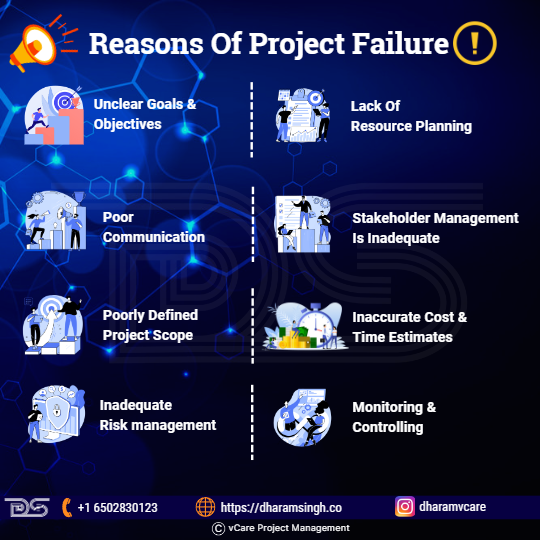
Reasons of Project Failure
So here’s to planning ahead of time and avoiding these common project pitfalls.
- Unclear Goals And Objectives
Businesses that fail to set clear employee goals and objectives waste significant time and effort. The following are the consequences of ambiguous project goals and objectives.
- Unclear objectives lead to ambiguous operational methods.
- Individually, the level of performance can be justified.
- It’s not always obvious when a project deviates from its original path.
- People involved in a project cannot work to their full potential.
- Lack Of Resource Planning
In project management, resources refer to people, money, and materials. Human resources are likely underutilized or overworked if you do not use a good task management tool.
Another critical aspect of project resource planning is financial planning. Projects with poor cost estimation and inconsistent tracking will almost certainly go over budget. In addition, project managers who do not understand how to track and manage finances are more likely to fail the project.
- Poor Communication
Poor communication in the workplace can have disastrous consequences for the project, including poor collaboration and decreased productivity, resulting in stressed employees, dissatisfied customers, and workplace mistrust.
Whether it’s delayed communication, a lack of communication, or no communication at all, the fact is that the project is likely to fall through the cracks if the project professionals don’t have an effective communication strategy in place.
- Stakeholder Management Is Inadequate
Stakeholders have an inherent interest in the project, for better or worse. Project managers are responsible for identifying and communicating with all stakeholders promptly and without delays. Unfortunately, there are numerous reasons for poor stakeholder management, some of which are listed below.
- Stakeholders are too narrowly defined.
- Failure to strike a balance between compliance and strategic opportunities
- Stakeholders are prematurely removing resources.
- Stakeholders’ disinterest
- Stakeholders are unaware of the project’s progress.
Engaged stakeholders provide support and insights to help a project succeed, whereas disengaged stakeholders can become barriers to success.
- Poorly Defined Project Scope
The project scope details everything you intend to do (and not going to do). In project management, scope creep refers to uncontrolled, continuous changes in the scope of a project. Conversely, a poorly defined project scope leads to scope creep, where the former is vaguely defined, documented, or controlled.
A project with an unclear project scope is more likely to fail and encounter a variety of issues, including:
- Failure to meet customer expectations
- Continual changes are being requested throughout the project’s life cycle.
- The budget exceeds the allocated budget.
- Failure to meet deadlines
- Inaccurate Cost And Time Estimates
Inaccurate cost and time estimate frequently result in team members making accurate predictions about the expected duration of tasks and the project’s cost based on an average duration of time and cost for previous projects.
Inaccurate estimates are frequently the result of two underlying causes:
- Upfront planning
- Poor estimation practices
- Inadequate Risk management
Risk management enables project managers to identify and analyze issues that may arise during the project and impede its progress. If risks are not effectively managed, they will likely emerge during the project’s later stages, causing significant scope creep. Conversely, poor risk management can lead to project delays, low user adoption, late assignments, overspent budgets, and project failure.
- Monitoring And Controlling
Monitoring and controlling the project is one of the lesser-known facts that project managers and their teams often overlook. However, a project manager needs to “track, review, and regulate the project’s progress; identify areas that require changes in the planning, and initiate the corresponding changes.”
Every effort should be made to keep the project on track, and if it falls behind budget or schedule, the plan should be adjusted to get the project back on track.
How to Recover a Failing Project?
Three key questions you can ask to quickly and clearly understand the project.
- Are the problems internal or external?
You can determine whether the source of the problem is internal (and thus correctable) or external (outside of your control).
Review project documents such as the charter, plan, and schedule for:
- Requirements from relevant stakeholders.
- A reasonable timetable with attainable goals.
- Allocation of resources
- A method of collecting and managing change requests.
- Unexpected expenses (internal and external).
- Success metrics.
- A procedure for upholding quality standards.
- Why are we behind schedule?
Next, determine why the project is running late.
- Were tasks properly prioritized?
- Were tasks clearly explained?
- Was the timetable overly ambitious?
- How frequently did the project manager provide status updates?
- Who made important project decisions?
- Is there a record of decisions and change requests?
- How were risks communicated and addressed?
- Was the initial budget adequate?
- Is the team working effectively?
Finally, consider how well the team worked together.
- Did the team understand the project’s goal and its roles and responsibilities?
- Was the team using the same procedures and tools?
- Did the team meet regularly to share updates and challenges?
- Was a clear communication strategy in place?
- Were the right people assigned to the project?
- Were there any issues with suppliers or vendors?
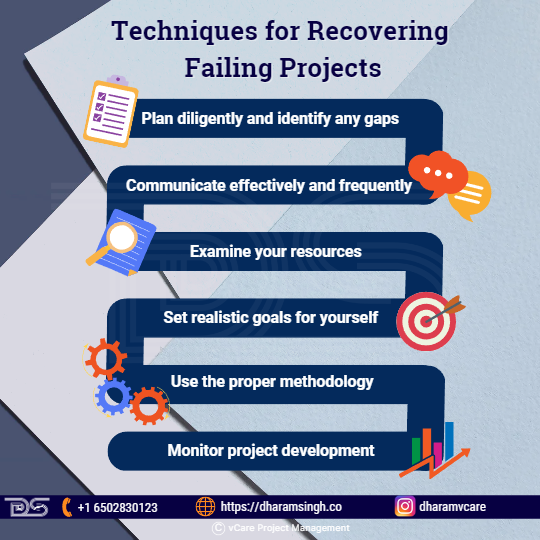
Techniques for Recovering Failing Projects
Techniques for recovering failing projects
While failures are unavoidable in project management, project professionals can always learn from the failures to succeed in the future. So, let’s look at how project managers can ensure that their next project runs smoothly and that any potential problems are identified and resolved before they become too large to cause project failure.
- Plan diligently and identify any gaps.
- Communicate effectively and frequently.
- Examine your Resources
- Set realistic goals for yourself.
- Use the Proper Methodology
- Monitor Project Development
Strategic alignment in project management
Strategic alignment in project management refers to aligning project goals with your organization’s long-term vision and mission.
Contrary to popular belief, strategic alignment in project management does not only refer to establishing and maintaining key financial metrics. Instead, it’s a broad concept that encompasses everything from key financial and quality indicators to customer satisfaction, brand recognition, and value proposition.
Every project has a goal. While some may seek to provide a service or product, others may seek intangible benefits such as positive customer relationships or company goodwill. These strategic goals guide a project professional’s day-to-day business operations and help them turn their ideas into desired results.
Importance of Strategic Alignment in Project Management
- Focus the energy in the right place
- Allow for productive team collaboration
- Describe the organization’s competitive advantages
- Manage priorities that conflict
- Avoid duplication.
- Accept market manoeuvrability
Leadership performance is significant to project success
Effective leadership in project management is the ability to persuade people of the need for change, stimulate new ways of thinking and problem solving, and encourage them to achieve project objectives. Leadership also guides team members to grow as professionals while completing their project responsibilities.
Today’s evidence-based theories of leadership can be characterized into six major classes, which include:
- Attributes
- Behavior
- Contingency
- Visionary
- Emotional intelligence
- Competency
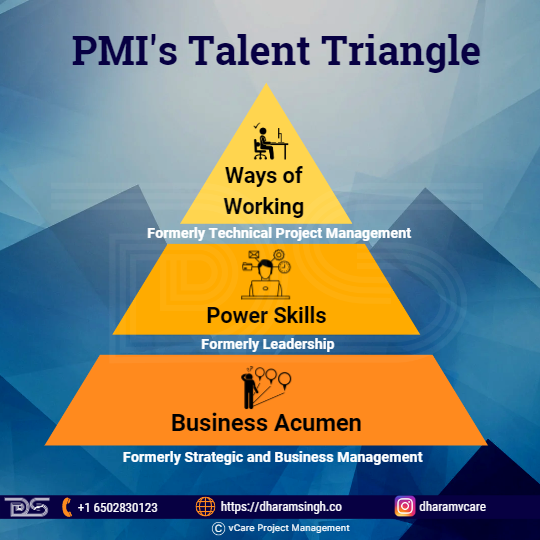
PMI’s Talent Triangle
PMI’s Talent Triangle – How to Stand Out as a Successful Project Manager
Project managers must be more agile and resourceful than ever to keep up with and make an impact in a fast-changing world. PMI has always been dedicated to assisting project professionals in developing strong skills. Nonetheless, project managers now require a skill set that includes a variety of disciplines and practices, as well as other in-demand skills.
To assist project professionals in navigating this changing world of work and embracing smarter ways of working, project professionals need to focus on:
- Ways of Working: Formerly Technical Project Management
- Power Skills: Formerly Leadership
- Business Acumen: Formerly Strategic and Business Management
Factors of project success
Project success has been defined as a project that meets its objectives on time and within budget. A development project’s success extends beyond meeting schedule and budget objectives. It also includes meeting the expectations of beneficiaries, stakeholders, donors, and funding agencies. However, defining these dimensions of success is more complicated and can only be assessed years after the project is completed.
Measuring project success after the fact is important because it aids in determining future strategies when planning new projects. Continuous improvement based on data from past projects enables project managers to identify problems before they occur. Using past data allows new processes to be implemented with fewer errors and greater management success.
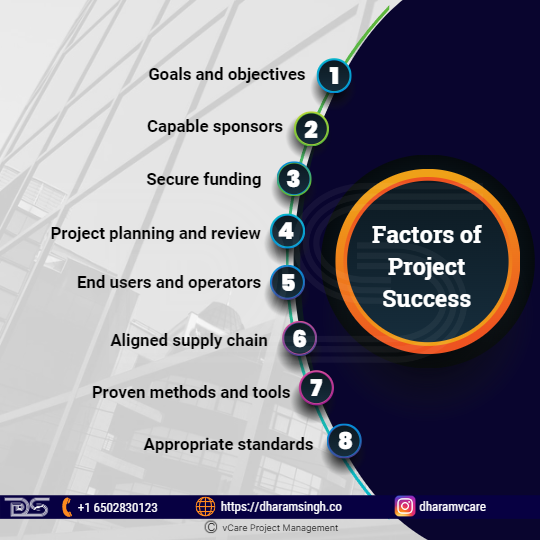
Factors of Project Success
Here are some of the factors for the project’s success:
- Goals and objectives
The project’s overall goal is specified and recognized by all stakeholders; it is not at odds with subsidiary objectives, and project leaders have a clear vision of the project’s outcomes.
- Capable sponsors
Sponsors play an active role in the project’s life cycle; they bear ultimate responsibility and accountability for the project’s outcomes.
- Secure funding
The project has a secure funding base; contingency funding is recognized from the start, and budgets are strictly regulated to ensure maximum value is realized.
- Project planning and review
Pre-project planning is thorough and considered; progress is monitored regularly and carefully; the project has realistic time schedules, active risk management, and a post-project review.
- End users and operators
End users or operators are involved in the project’s design; the project team works with users who can effectively and efficiently implement what the project has produced.
- Aligned supply chain
All direct and indirect suppliers know the project’s requirements, timelines, and quality standards. As a result, the supply chain’s higher and lower tiers are coordinated.
- Proven methods and tools
Good project management tools, methods, and techniques are used to maintain an effective balance of flexibility and robustness.
- Appropriate standards
Quality standards are actively used to drive output quality. In addition, other standards are regularly monitored to ensure delivery at the best practice levels.
Knowing what success factors are important at the end of a project is critical for assessing how that project went and making changes for the next one. It is critical to understand what distinguishes success from failure.
By investing time in learning about the future of project management, project professionals will be better prepared to capitalize on new opportunities and develop their skill set accordingly. So many opportunities for growth and success are on the horizon; use these trends and factors to propel your company, projects, and team to new heights!
Feel free to check out my discussion on this topic with Thomas Walenta in YouTube
For any questions related to your Project Management career, training, and certifications, you can book an obligation free 15 minutes session with me by visiting talktodharam.com
You can subscribe to the vCare Project Management YouTube Channel to catch future videos of our Q&A series and certification success stories: https://bit.ly/2YF0wJl
You can subscribe to and follow my podcasts and interviews with Project Management Experts on YouTube at https://bit.ly/2NDY8wd
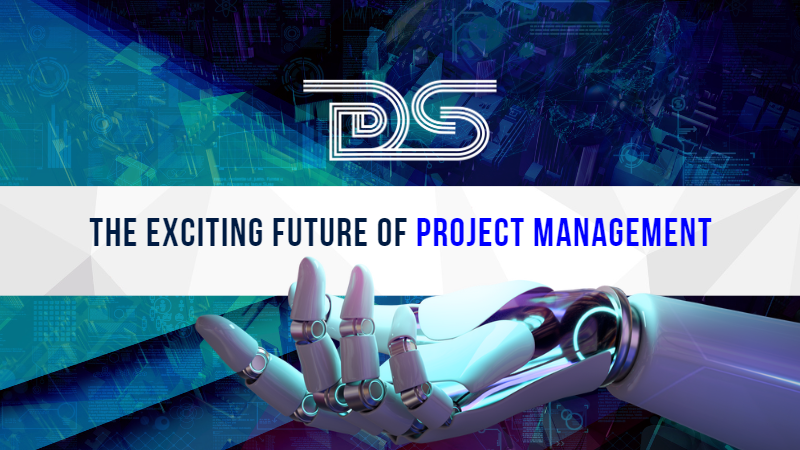
by DharamCW | Nov 28, 2022 | General
Project management “is the application of tools, knowledge, processes, and competencies to ensure the successful completion of a project.” Projects are time-bound endeavors that seek to generate value through products, services, or outcomes that meet the project’s objectives and success parameters.
Project Management Institute (PMI) defines project management as “the use of specific knowledge, skills, tools, and techniques to deliver something of value to people.”
Project management is leading a team’s work to achieve all project goals within the constraints set. The primary rules are scope, time, and budget. The secondary task is to optimize the allocation of required inputs and apply them to achieve predefined goals.
Project managers are essential to a project’s success and are in high demand. They employ various skills and knowledge to engage and motivate others to achieve the project’s objectives. By 2027, employers will need 87.7 million individuals in project management-oriented roles as per the “Job Growth & Talent Gap 2017-2027” report.
“The Future of Project Management By Harold Kerzner, Ph.D., and J. LeRoy Ward International Institute for Learning (IIL)” article discusses four new principles to determine what types of project management training we believe are available to project managers in most of today’s successful business models.

Four Principles of Project Management Training
- First and most importantly, project management is now viewed as a business process in which project managers are expected to make business and project-related decisions.
- Second, project management is no longer viewed as a collection of operational or tactical activities to produce a deliverable or outcome.
- Third, project management is now a delivery system for achieving the desired business benefits and value.
- Fourth, project management is no longer just another career option within a company.
As more and more digitization is growing, project management has never been as exciting as it is now. The overall trend is an increase in the need for project managers. Project management is no more a job that deals with Gantt charts and ticking off a checklist.
Project management has always been a great profession to be in. It allows one to work with people, deal with risks and conflicts, and the ability to manage the outcomes for the business. It always gives you a feeling of importance and provides the opportunity to take leadership to drive the business goals. It greatly enhances your soft skills and helps you work with people to improve their capabilities along the project.
Apart from this, a project management profession helps you develop yourself and constantly provides new challenges every day. As the business grows dynamically, newer challenges and opportunities are managed by the project managers of today’s times. It provides career progression in terms of becoming a project manager, program manager, portfolio manager, and so on.
Project Management Trends
The project management industry rapidly evolves with the latest trends, tools, and technologies as the changes in trends in project management are dynamic and unavoidable. Therefore, understanding current project management trends will help us stay on top of the profession or business.
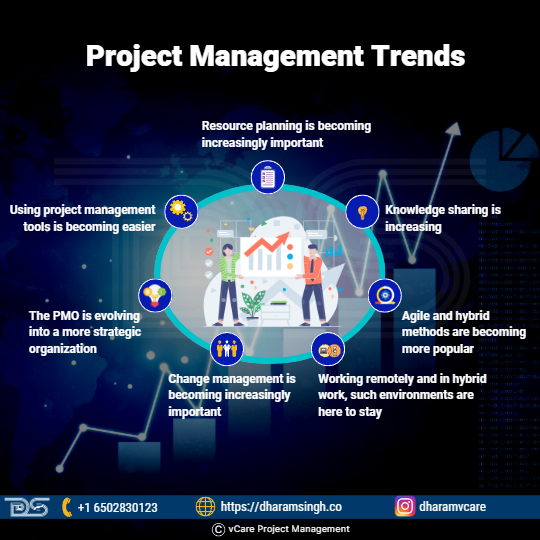
Project Management Trends
Trend 1: Resource planning is becoming increasingly important.
Trend 2: Knowledge sharing is increasing.
Trend 3: Agile and hybrid methods are becoming more popular.
Trend 4: Working remotely and in hybrid work, such environments are here to stay.
Trend 5: Change management is becoming increasingly important.
Trend 6: The PMO is evolving into a more strategic organization.
Trend 7: Using project management tools is becoming easier.
In a post-pandemic world, employing top project managers is more important than ever. Remote working, upskilling, and the pandemic’s lingering effects will shape the future of project management.
Increasing Emphasis on Soft Skills
Traditionally, the value of project managers was determined by their certifications and ability to implement various methodologies. However, many organizations are shifting their emphasis to soft skills. This project management trend is understandable, as AI-powered solutions have advanced to the point where they can handle the more challenging technical aspects of project management.
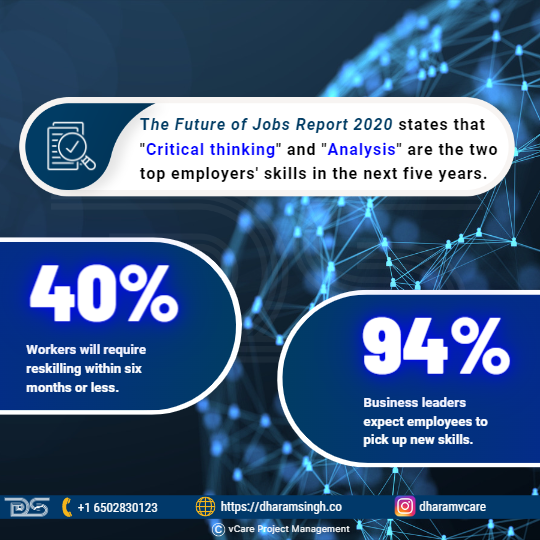
The Future of Jobs Report 2020
The Future of Jobs Report 2020 states that “Critical thinking” and “Analysis” are the two top employers’ skills in the next five years. 40% of workers will require reskilling within six months or less. 94% of business leaders expect employees to pick up new skills.
Project managers must now focus on improving their soft skills in conflict resolution, stakeholder engagement, negotiation, mentoring and training, decision-making, and team building. Practicing these skills will enable project managers to add more value to their organization.
Predictions for the Future of Project Management
“Change is the only constant,” as the adage goes. Project teams are no longer smaller, and the projects are no longer more straightforward. It appears to be true in the project management industry. The project management landscape is rapidly changing with evolving technologies, tools, and the latest trends.
Unlike the olden days now, there are a lot of tools, techniques, and methods that project managers can adopt to make the job much easier and more effective. Three major factors that would impact are:
- The Dynamically changing technology landscape.
- Increasing organizational complexity with Remote & Hybrid Work.
- Sustainability/Ecological concerns.

Factors Impacting Future of Project Management
1. The Dynamically changing Technology landscape
We will look at how the future of project management is evolving and exciting as the future holds concerning some of the changing technology components which are emerging.
a.) The growth of Artificial Intelligence (AI) and Automation
According to the Project Management Institute, 81 percent of professionals believe that AI impacts their organizations. Project managers are given a chance to focus their efforts and energy on tasks that will most significantly benefit their businesses. Automation can help project managers to effect more significant change and increase the chances of each project achieving its strategic goals.
By 2030, AI will have taken over 80 percent of the work of today’s PM discipline, including data collection, tracking, and reporting (Gartner, 2019).
PMI’s Pulse of the Profession report emphasizes the importance of data science skills, an innovative mindset, security and privacy knowledge, legal and regulatory compliance knowledge, the ability to make data-driven decisions, and collaborative leadership skills.
According to PwC’s ’22nd Annual Global CEO Survey, in the next five years, 85 percent of CEOs believe AI will significantly change how they do business. Even though it is still in its early stages of development, AI can be used in project management to reduce highly complex issues and play a significant role in their success.
In recent years, organizations have adopted AI on a larger scale to ensure successful project completion in a variety of ways, including:
- Producing performance insights
- Assisting in decision-making processes
- Estimating and forecasting
- Optimizing resource allocation
- Making data visualization possible
- Conducting risk analysis
AI with chatbots can even be integrated for project management reports and status on tasks. Also, the status can be updated from anywhere and anytime. It can help as an intelligent project assistant. Already products like PPM Express are working in this space. In construction and engineering space, AI can be used for monitoring sites and site inspection with the help of OpenCV, Drone cameras, etc. Large enterprises are using AI for intelligent resource deployments for projects.
b.) Rise in Data Analytics Focus for Data-Driven Project Management
Every day, organizations of all sizes generate massive amounts of data as it is only logical to use that data to notify decisions. Data analytics and reporting can assist project managers in identifying early signs of scope creep, calculating project progress rates, and other tasks.
AI-powered analytics provide a comprehensive picture of the entire organization and all projects. They provide granular visibility into activities and generate custom reports to assist project managers in visualizing data as required. With these tools, project managers can make informed decisions in real time rather than making gut-based decisions based on manually compiled reports.
c.) Advanced Project and Resource Management Tools
According to a 2020 report from Wellingtone, 54 percent of organizations lack access to real-time KPIs for their projects, and more than a third spend more than a day collecting data. This result demonstrates that project management tools can no longer be overlooked. When combined with AI-based automation capabilities, project management software can positively change how organizations manage their projects, regardless of their complexity.
Project managers of the future cannot survive without digital skills. The learning and experience on these tools will help appropriately present data and enhance decision-making with stakeholders. Current project management tools have become digital. Collaboration is seamless. For making effective decision making, the project managers need to have a good hold on the areas like the following:
- Data analysis, analytics, and management
- Security and data protection
- Legal and regulatory compliance
- Online collaboration and leadership (JIRA, Confluence, etc.,)
- Knowledge management (Sharepoint, Google Docs, etc., )
- Data-driven decision making. (BI Tools – Power BI, Tableau, etc.,)
Here are some examples of how the appropriate software can make a significant difference in future project management:
- Use historical project data to improve bids and plans for future projects.
- View resource availability, skills, and other details to make resource allocation easier.
- AI can automatically track all time spent on tasks and projects.
- To stay on top of finances, quickly allocate and track budgets.
- In real-time, capture all expenses with invoices for all projects.
- Track all projects using customizable dashboards to make better quick decisions.
- Maintain real-time communication with all stakeholders and team members about the project’s status, progress, and changes.
d.) Internet of Things:
The Internet of things is a network of electronic sensors and actuators that can help interact with each other and exchange data for numerical applications. We already see its application in the form of Alexa, Digital watches, Smart Vending Machines, and many more. The Internet of things can provide useful real-time data and help in various ways in project management. Assuming you are working on a team or sensitive project with technical and regulatory characteristics that need real-time data with a higher speed of reporting. IoT can help improve process control and also manage the explosion of valuable data on the project from sensors and devices. Project Managers can use these IoT technologies to reduce the workload in collecting data and streamline the reporting efforts.
e.) Digital Twins:
The Internet of things has been evolving, and it has been contributing to a lot of industries in terms of monitoring, real-time analytics, etc.; Projects involving Infrastructure, Construction, and industries would need a lot of physical presence. Digital twins can work with CAD and BIM (Building Information Modeling) data sets. Projects executed on these domains also call for ensuring the safety of the stakeholders involved in the project. In such scenarios, a digital twin can provide digital replicas of the physical objects or the location, which can encompass the project’s design and engineering aspects, which should help minimize travel/physical presence at the engineering sites. This action would also greatly enhance the better visibility of the sites in digital means for faster and more responsive actions on the project, yet contributing to sustainability via fewer carbon footprints. Digital twins provide intuitive visuals of the project situation with context and help to make decisions faster.
2. Increasing organization complexity with Remote & Hybrid Work
Remote working was already popular, but it has skyrocketed to unprecedented levels in recent years. While the global pandemic forced organizations to allow employees to telecommute due to safety concerns, remote work tends to continue for the foreseeable future. This aspect presents some intriguing challenges to project managers. According to Forbes, up to 97 percent of employees are unwilling to return to their offices full-time.
There have been renewed efforts in the post-pandemic era that many organizations have begun to experiment with a hybrid approach that combines elements from two or more methodologies. It is no longer just about agile, scrum, or lean but about combining specific attributes for increased flexibility in driving project success. This approach has enabled organizations to develop distinctive approaches to particular industries and projects.
The hybrid concept extends to the development of project team structures. The Capterra report states that 37% of teams are cross-functional and led by a dedicated PM. Cross-functional teams can share their department’s best practices for the project team to decide whether they want to incorporate them into their processes.
Hybrid project management is evolving. Projects are complex with a mix of technology, domain, people, process, and tools. Many organizations are not even ready for such a change to adapt themselves. Based on recent research by IPMA(International Project Management Association), only 47% of organizations are using agile approaches. Situations like the COVID-19 Ukraine-Russia conflict are making the environment more uncertain. Geopolitical situations can put countries and global projects at risk, increasing the challenges for project managers to be dynamic and responsive.
The project managers have to address problems like the following, which could be exciting and challenging:
a) More collaboration with contractors and suppliers
b) Higher staff turnover
c) Stakeholders having competing demands and expectations
d) Need for decisions taken faster
e) Increasing complexity in regulations and governance
Due to the inherent nature of dynamic technological changes, there is a need to manage constant training/coaching for the project members involved. This context keeps the project manager and project executives current and on the learning curve. In the future, project managers will be successful if they break the typical corporate mindset. They will be the ones who work with a hybrid approach and mindset. The term “hybrid” refers to the ability of the Project Manager to take an adaptive approach to the multiple roles and provide value with cross-functional/diverse teams.
Though technology plays a central role in project management, the project managers are expected to have great levels of emotional intelligence to manage the project members. The Project Manager needs to maneuver through social skills and empathy. This move would greatly contribute to the productivity and quality of the projects.
3. Sustainability / Ecological concerns
Project managers have to become socially responsible in alignment with the organizational culture, structure, and processes, starting with environmental analysis as per the PMBOK Guide. It would be exciting for the project managers to contribute to sustainability by adding the sustainability objectives to the project charter apart from the financial business case. This action might call for additional training on aspects like sustainability LCA(Life Cycle Assessments).
From sourcing to day-to-day operations in the project, the project manager needs to consider minimizing the carbon footprint, and it’s no more a thing specific to governments. Sustainability involves balancing different concerns:
- Environment, such as climate change
- Society, such as community
- Economy, such as affordability
- Administration, such as health and safety
When these four elements are considered, we can build sustainability into projects. (Reference: APM Body of knowledge 7th Edition)
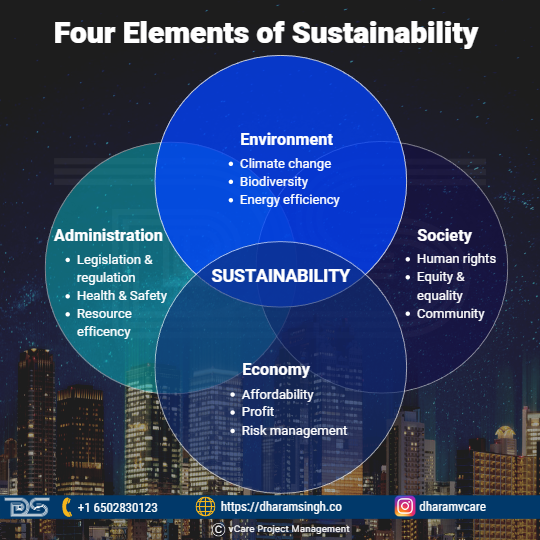
Four Elements of Sustainability
Project managers need comprehensive risk management when it also calls for transparent project communication. Especially when it comes to a project with a high level of material handling, sustainability aspects in terms of procurement from the right suppliers, verification of the sources, material origin, quality of the material, etc., would come into context. Project managers must look from all the above perspectives to make sustainable project management a reality.
Conclusion
The project management profession has come into an exciting phase as it’s more challenging and has more tools to make it easier. Only with an appropriate level of training on the tools and adoption of emerging trends would project managers be able to sustain it. The project managers’ skills move in the direction of having focus, multi-skill leadership, emotional intelligence, change management, and negotiation skills. Achieving certifications would be to have an aspect to prove your credentials and have a structured approach to your thought process complementing your experience and skills in these areas outlined in this article.
Understanding current project management trends and predicting the future of project management is critical for staying on top of the profession. Considering the predictions, the future looks bright for those who can adapt to changing trends by expanding their knowledge of new tools and techniques and pursuing accreditation for project management in their specific industries.
Feel free to check out my discussion on this topic with Thomas Walenta in YouTube
You can subscribe and follow my podcasts and interviews with Project Management Experts on YouTube at https://bit.ly/2NDY8wd
You can subscribe to vCare Project Management YouTube Channel to catch future videos of our certification Q&A series and student success stories using the link https://bit.ly/2YF0wJl
For any questions related to Project Management career, training, and certifications, you can book an obligation free 15 minutes session with me by visiting talktodharam.com


























Recent Comments